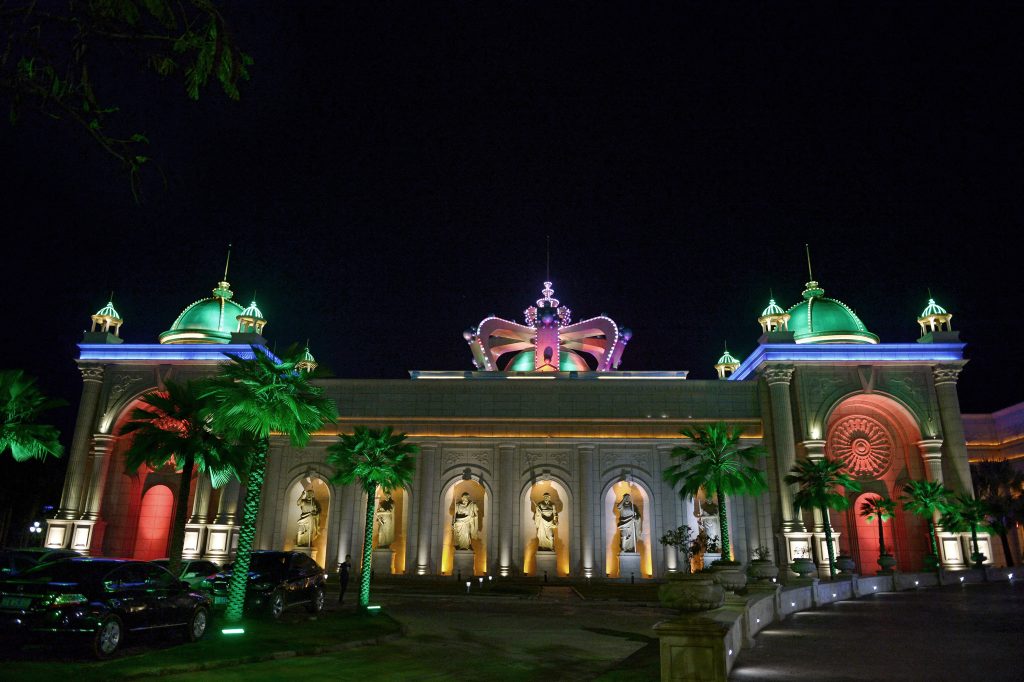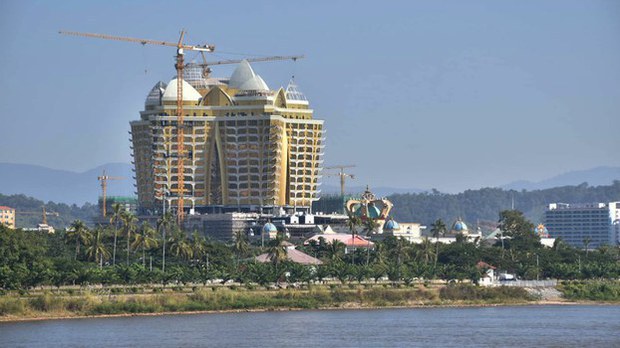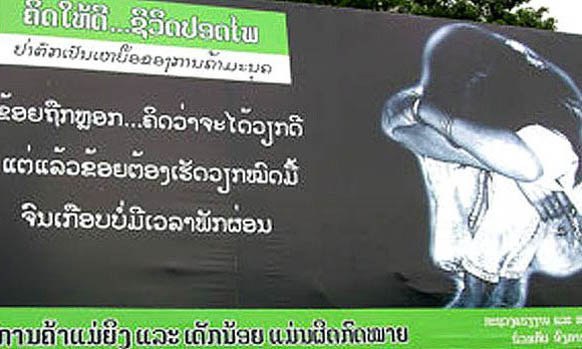When a young woman from the Lao capital Vientiane took on a job as a “chat girl” at the Kings Romans Casino in far northern Laos, she saw a chance to earn an honest living selling shares in her new company to casino patrons.
But only months after she was recruited and had already agreed to take on debt to finance her application fees and moving expenses, she was told she would have to start selling sex when she couldn’t meet impossibly high sales quotas.
“We have to get enough customers, meaning we have to be able to persuade up to 100 people to buy the company’s shares. For me, that was an unreachable goal,” she told RFA’s Lao Service December 13.
“Most of us can only get one or two investors a month. If we are unable to reach our goal, they will trade us to other companies, making us do other kinds of jobs, including sexual services,” she said.
The Vientiane woman was able to contact the authorities and was rescued before it came to sex work, but she said she was but one of hundreds of Lao women who were at risk of being forced into prostitution in the Golden Triangle Special Economic Zone (SEZ) in northern Laos.
The zone in Bokeo province is run by Zhao Wei, chairman of the Dok Ngiew Kham Group, with Zhao’s firm holding 80 percent interest and the Lao government holding 20 percent. Located where Laos, Myanmar and Thailand meet, the Golden Triangle area got its name five decades ago for its central role in heroin production and trafficking.
In 2018, the US Treasury Department declared Zhao Wei’s business network, centered on Kings Romans Casino, a “transnational criminal organization” and sanctioned Zhao and three other individuals and companies across Laos, Thailand and Hong Kong.
Zhao’s business “exploits this region by engaging in drug trafficking, human trafficking, money laundering, bribery, and wildlife trafficking, much of which is facilitated through the Kings Romans Casino located within the GT SEZ,” said a Treasury statement.
Laos, which has been under US pressure for years to crack down on trafficking, this year remained at tier 2 in the annual State Department Trafficking in Persons Report, avoiding cuts to certain types of foreign aid that are imposed on tier 3 countries.
The 2021 report said Laos increased its overall efforts to combat trafficking, but fell short in victim identification and screening procedures, and failed to adequately investigate suspected perpetrators of sex trafficking.

‘A lawless playground’
The Golden Triangle SEZ, however, operates largely beyond the reach of the Lao government, a 20 percent shareholder of the project, built on a 10,000-hectare (24,700-acre) concession Vientiane granted Zhao’s firm for 99 years. Inside the SEZ, a glitzy and gaudy city in the jungle near Laos’ border with Thailand, China’s currency, language and time zone are used and ordinary Lao citizens are kept out.
“The dark side of the casino industry includes human trafficking for the sex trade and wildlife crime,” said the Environmental Investigation Agency, a UK NGO, in a 2016 report that called the SEZ “a lawless playground, catering to the desires of visiting Chinese gamblers and tourists.”
The Golden Triangle casino did not respond to efforts by RFA’s Lao Service to seek comment on the chat girl program and trafficking accusations.
The recruitment advertisements on social media that attracted the Vientiane woman, who requested anonymity for safety reasons, hinted at the type of work that lay in store.
“Lao Women Wanted: All good-looking women between 18 and 35 who can speak Chinese, Lao, Thai and English should apply. Salary 5,000 yuan (US$785) per month, free food, free accommodation and no application fees,” the ads read.
Recruits are told that their job is to sell stock in Golden Triangle SEZ companies to casino customers, pitching them popular text messaging platforms.
Sales quotas are too high for the majority of women to meet. Their debts then can be held over their heads, and they can be forced to sell their bodies.
“I got a job in the call center, then I failed to achieve the target, so I was going to be forced to sell sex. But I was lucky, I was rescued by the authorities just in time,” the woman said.
She said her employer did not at first tell her and other workers about their debts. But after being quarantined as a COVID-19 precaution for 21 days, the company told them they owed 20,000 yuan (US$3,142) each, she said.
According to the woman, hundreds of women fall victim to the scam each month because unemployment is high in many parts of Laos.
“The main reason I took this job was that I was jobless. There were no jobs at all in Vientiane. I tried to get into the retail business, but it didn’t go well because of the COVID-19 pandemic,” she said.
“The ad of the company also promised very attractive wages and free accommodation. This is how I almost became a victim of human trafficking. I am sure that many other Lao women are in the same situation I was.”

‘Beautiful…light skin…tall’
Not all the women from the call centers are traded to work as prostitutes, another young woman, a 21-year-old from nearby Oudomxay province, told RFA.
“If you are traded, a pimp will first look at you. If you’re beautiful and have light skin and are tall, they’ll send you to provide sexual services. If you’re not, you’ll be traded to do other jobs like waiting tables and cleaning to pay your debt,” the Oudomxay woman said.
“Working at the call center is risky. The company that hires us pays a lot of money, up to 30 million kip to recruiters. If we are unable to do the job the company can trade us. Once we’re traded, we can’t go home if we don’t have money to pay off our debts. That is how they can force us to sell our bodies,” she said.
She also said that she was almost traded to be a sex worker herself, but she took a job in the casino’s laundry room.
Sometimes the trafficked women even become madams themselves.
“After working for two years as a sex worker in the SEZ, I am now recruiting women to work as prostitutes in the casino,” a woman from Luang Namtha province told RFA.
“I can confirm that most sex workers here are willing to do the job because they need money to pay back their massive debt,” she said.
A recruiter told RFA that not all chat girl call centers sell new recruits into the sex trade.
The women talk to customers by texting them over applications like Line, WhatsApp and Facebook messenger. Each woman’s sales quota is determined by the employer.
At the beginning stages the women go through training. Workers who don’t make their quota earn 3,000 yuan a month, while those who exceed the quota make 5,000 yuan plus a 15% commission.

Missed quotas mean no food
“A coach will train the workers and set the quota for each worker. Then the workers will talk to the customers and try to convince them to invest with the company. If the customers agree to invest, the workers will get paid a salary and commission,” the recruiter said.
“However, there are many companies at the call center. Some are good and they would place new workers on probation for three to six months. If they perform poorly, they are sent back home. But some other companies aren’t good, and they force the workers to sell sex to pay back their debts because the company feels like it bought the workers at high price from us,” he said.
Typically, each woman “costs” 20,000 yuan (US$3,142).
Another recruiter described how a debt trap is used by some of the companies to force the women to become prostitutes.
“Some companies won’t even let the women eat if they don’t meet their quota, because they bought them at such a high price. To get the money back, the company sells the workers to other companies or forces them to sell sex,” the second recruiter said.
“Their debt is as high as 20 million kip [$1,800], so many women choose to sell sex because that’s the only way they can pay off their debt.”
With so many chat companies selling shares at the casino, business is very competitive, so most chat girls will never reach their quota.
Many women in the debt trap have attempted to reach out to Lao authorities for help, but their jurisdiction over the SEZ in Bokeo, the country’s smallest province, is limited.
The Department of SEZ Promotion and Management in Bokeo province issued a notice on Dec. 7 that stated workers in the zone who want to return to their homes must register with authorities and provide their names, addresses, home province and phone number.
“The SEZ is under Chinese control. Workers can’t go out,” an official of the department told RFA.
“If they need help, they or their family will have to write a letter of complaint to the provincial authorities so that we can go in and help them,” the official said.
Even the provincial anti-human trafficking department cannot freely enter the SEZ, where most of the exploited women are from other provinces in Laos, a country of 7 million people.
“The Golden Triangle SEZ is under Chinese control. We can’t get in there,” an official from the department told RFA.
“They have to contact the SEZ management department, which can then contact the SEZ. Sometimes it takes a long time. Sometimes it doesn’t work at all,” he said.
Many of the women who come to work in the SEZ are smuggled in, the department official said.
“Since the beginning of this year, the Bokeo anti-human trafficking department inspected 88 trucks traveling into the province and found hundreds of Lao workers coming in from other provinces. None of the women had documents showing that they were legally recruited by the SEZ,” he said.
The Bokeo branch of the Lao Women’s Union, a government-aligned rights organization, has helped three Lao women escape to return to their homes in Vientiane over the past several months, a member of the group told RFA.
All the three women learned that they would be sold to sex trade, so they sought help from the authorities.
“Sometimes, the women don’t even get a chance to work as chatters, they are just traded to do another type of work. Others get the job but fail to reach their quotas,” the Women’s Union member said.
“They all come from other provinces, and they have to do the dirty deed. Some of them are traded to work as waitresses at restaurants and exploited there too,” she said.
Copyright © 1998-2020, RFA. Used with the permission of Radio Free Asia, 2025 M St. NW, Suite 300, Washington DC 20036. https://www.rfa.org.







